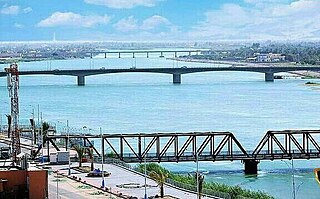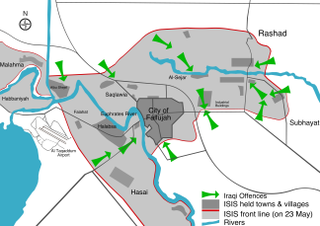
Fallujah is a city in Al Anbar Governorate, Iraq. Situated on the Euphrates River, it is located roughly 69 kilometres (43 mi) to the west of the capital city of Baghdad and 50 kilometres (31 mi) from the neighboring city of Ramadi. The city is located in the region defined as Sunni Triangle by the United States, as majority of its residents are Arabic-speaking Sunni Muslims. In 1947, Fallujah was a small town with a relatively small population but had grown to a population of about 250,900 people by 2018.

A Jersey barrier, Jersey wall, or Jersey bump is a modular concrete or plastic barrier employed to separate lanes of traffic. It is designed to minimize vehicle damage in cases of incidental contact while still preventing vehicle crossovers resulting in a likely head-on collision. Jersey barriers are also used to reroute traffic and protect pedestrians and workers during highway construction. They are named after the U.S. state of New Jersey which first started using the barriers as separators between lanes of a highway in the 1950s.

The Highway of Death is a six-lane highway between Kuwait and Iraq, officially known as Highway 80. It runs from Kuwait City to the border town of Safwan in Iraq and then on to the Iraqi city of Basra. The road was used by Iraqi armored divisions for the 1990 invasion of Kuwait. It was repaired after the Gulf War and used by U.S. and British forces in the initial stages of the 2003 invasion of Iraq.

Kurdistan Region (KRI) is a semi-autonomous federal region of the Republic of Iraq. It comprises four Kurdish-majority governorates of Arab-majority Iraq: Erbil Governorate, Sulaymaniyah Governorate, Duhok Governorate, and Halabja Governorate. It is located in northern Iraq, which shares borders with Iran to the east, Turkey to the north, and Syria to the west.
On 18 February 2007, three car bombs exploded in predominantly Shia areas of Baghdad, killing at least 63 people and injuring 131. The bombings occurred despite a huge military offense, led by US and Iraqi troops, starting days before.
As Saqlāwīyah is a city in Al Anbar Governorate, in central Iraq. It is located roughly 5 miles northwest of the city of Fallujah.
Operation Dawn-1 was an Iranian offensive in the Iran–Iraq War. On April 10, 1983, Iran struck Ayn Al-Qaws with the immediate objective of Al-Fakkah Field to capture the Baghdad-Basra Highway. The operation was fought mostly by Pasdaran forces and was one of the three costly human wave offensives of 1983, the Iranians failed to defeat the Iraqis.
Adailiya is an area and a suburb of Kuwait City; it is located in the Capital Governorate in Kuwait. It had a population of 21,996 in 2022. Adailiya houses a campus of Kuwait's Public Authority for Applied Education and Training (PAAET) and, temporarily, the colleges of Architecture and Life Sciences at Kuwait University as well as the Kazma Sport Club and religious, cultural, and commercial places. It also has a Water Towers Park.
Road 48, unofficially called Karbala Highway, is in Markazi Province, Hamedan Province, and Kermanshah Province in western Iran.
The Battle of the Bridges was a battle that took place on 2 August 1990 in Kuwait, following the Iraqi invasion of Kuwait.
Khosravi is a village in, and the capital of, Alvand Rural District of the Central District of Qasr-e Shirin County, Kermanshah province, Iran.
Haji Omeran, is a town located in Iraqi Kurdistan's Erbil Governorate near the Iran–Iraq border. It is 180 kilometers northeast of the Erbil and 20 kilometers east of the Choman. The town is inhabited by Kurds.

National Highway 73 is a National Highway in India. This highway runs in the Indian state of Karnataka. It starts from sea port city of Mangaluru ( Mangalore) and ends at Tumakuru. Even though named as national highway the road is narrow and prone to landslips and falling of trees in Charmady ghat section of Western ghats. This highway was previously part of national highways 48, 234 and 206 but subsequent to rationalisation of national highway numbers of India by Gazette notification on 5 March 2010 it was changed to National Highway 73.

The November Sinjar offensive was a combination of operations of Kurdish Peshmerga, PKK, and Yezidi Kurd militias in November 2015, to recapture the city of Sinjar from the Islamic State of Iraq and the Levant. It resulted in a decisive victory for the Kurdish forces, who expelled the ISIL militants from Sinjar and regained control of Highway 47, which until then had served as the major supply route between the ISIL strongholds of Raqqa and Mosul.

The Third Battle of Fallujah, code-named Operation Breaking Terrorism by the Iraqi government, was a military operation against ISIL launched to capture the city of Fallujah and its suburbs, located about 69 kilometres (43 mi) west of Baghdad, the capital of Iraq. The operation began on 22 May 2016, three months after the Iraqi forces had started the total siege of Fallujah. On 26 June, Iraqi forces recaptured the city of Fallujah, before recapturing the remaining pocket of ISIL resistance in Fallujah's western outskirts two days later.

The Syrian Desert campaign was a large-scale military operation of the Syrian Army that initially started along the highway from Damascus to the border with Iraq against rebel forces during the Syrian civil war. Its first intended goal was to capture both the highway and the al-Tanf border crossing, thus securing the Damascus countryside from a potential rebel attack. Later, multiple other fronts were opened as part of the operation throughout the desert, as well as operation "Grand Dawn" against ISIL with the aim of reopening the Damascus-Palmyra highway and preparing for an offensive towards Deir ez-Zor.

Smoking in Iraq is a widespread and culturally accepted behavior in Iraqi society. Since 2003 however there has been a greater push from the government to impose stricter rules. Since 2009 it is illegal to smoke in or around public buildings, although the ban remains unpopular with the Iraqi public and enforcement is inconsistent.
The Deir ez-Zor offensive (2018) was launched by the Islamic State of Iraq and the Levant against government-held areas throughout the Deir ez-Zor Governorate of Eastern Syria. During the offensive, on 8 June, ISIL managed to penetrate the city of Abu Kamal, capturing several parts of it.









